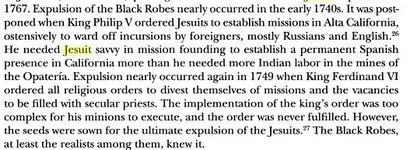Roy,
You're crazy if you think all the Jesuits were caught flat-footed by the arrests. I don't know how many may have been "in the loop" (so to speak), but obviously not all of them were privvy. Unless the good fathers that broke down crying (and the one that fainted) were Colonial Jesuit Academy Award Nominees in the category of "Best Bad News Overreaction", it is evident that only a select number of the fathers had any inside knowledge of the goings on at higher levels.
It makes all the sense in the world. Compartmentalization is used to this day. Only a few select people know everything. That way, even if tortured, most of the good fathers did not know, and therefore could not tell about any secret goings on (mining, hiding treasure, etc). It would also explain that using temporal coadjutors to run their mines and businesses for profit, would be mostly unknown to local Jesuit Priests (except maybe Father Visitadores or Visitador Generals). Just a thought.
Deducer,
I feel the same every time I read Father Och's Journals. I get the sense that he feels a sense of "I got away with it!" when he writes about the day of the arrests (26 June 1767). Read the whole episode about how they are so lax in guarding him, that he is able to have his boy bring up a container of burning coals, so he can ...........................................................
WAIT FOR IT!
...................................... BURN HIS CORRESPONDENCES! GEEZ! Why on Earth would a poor old Jesuit Priest feel the need to burn correspondences in the midst of a roundup of Jesuit Priests? What would he feel the need to hide from the Spanish? HHHMMMMMMMMMMMMMMMMMMMMMMMM?
Mike
Well for starters, I do not claim that
ALL of the Jesuits were caught, flat-footed. Perhaps I used a poor choice of words there, as it seems to have given the wrong impression. My point was that when the arrests were made, or as in the case of Arizona, the priests were called to come in,
there would have been NO opportunities for them to hide ANYTHING from that moment onward. They surely had to know that trouble was brewing for them, as has been pointed out previously, and I get much the same impression from father Och's words (actually a good writer, almost had a coffee-nostril fountain with that privy episode) that he was in effect laughing up his sleeve at the ineptitude of the Spanish in their searching efforts. Confident that they would NOT find the "goods". In Arizona specifically, on being notified that they must leave, the Indians would have been, heck not "would" but WERE left with no padre for some time, and as we can see in the Pueblo revolt, and in several stories with Apaches, it was the Indians whom covered up the mines, possibly for very different reasons than to keep them for the Jesuits or maybe for the Jesuits return one day. So I must still respectfully disagree, in particular about the mines, which were not even actively looked into by the Spanish except in Baja, and even that took some time (months) before they bothered to get around to examine those.
I don't think for a moment that any Jesuit mission, college or house, nor any other Order, would have had stacks of gold bars laying around in plain sight at ANY time; as we can see in the South American examples, virtually every church or house had a 'treasury' underground vault. Precious metals and other treasures would be stored in these vaults against dangers, which in S America was often enough pirate raids, but would work against the Spanish ever finding it too. To me it makes perfect sense that there would also be 'inventories' done periodically on this accumulated wealth, a matter of book keeping, and I believe the Tayopa inventory is just what it says it is. These vaults or tunnels
or caves would not be laying open for any passerby to see at any time, so would not have required special efforts to conceal it due to the expulsion. Also consider the possibility that the stories published in England may have been true, the Jesuits might well have been plotting to betray the Spanish colonies and had years of time to make sure their wealth was safely hidden. I put caves in bold because that is where father Kino hid the 'ornaments' of his own church, and on a wild frontier, caves would make for handy hiding places ready-made and not likely to be known to outsiders.
I missed that about the burning of his papers, and when viewed in context, as in the roundup of all Jesuits under the shadow of various accusations, burning correspondence does
NOT look so innocent to me.
Of course for those whom need to see
certified, notarized, sealed by what ever 'authority' type proof, you can always stay home and save your Vibrams for other things. The impressive treasure found in Brazil is apparently not certified enough for you, nor the treasure found in a Jesuit college in Spain. There is always the local city park however.



Roy




 ' springfield: Home free for furthering an ilegal entry
' springfield: Home free for furthering an ilegal entry 




